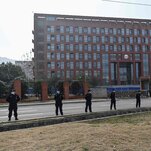Nissan to Cut Up to 20,000 Jobs Due to Record Losses
Japanese automaker Nissan Motor has announced plans to cut more than 10,000 additional jobs across various countries, which together with previously announced layoffs will reach approximately 20,000 employees. This represents about 15% of the company’s total workforce.
Massive Restructuring Due to Financial Problems
Nissan is taking radical measures to improve business efficiency amid a sharp decline in sales in key markets including the United States and China. The company forecasts record net losses ranging from 700 to 750 billion yen (approximately $4.74-5.08 billion) for the 2024 fiscal year, which ended in March. This is the worst financial performance in the automaker’s history, exceeding the previous record loss of 684.3 billion yen recorded in 1999.
Expansion of Crisis Response Measures
Last year, Nissan announced plans to cut 9,000 jobs and reduce production capacity by 20%. These measures are now being significantly expanded. In addition to large-scale layoffs, the company has announced the closure of three factories, including a facility in Thailand.
Nissan has also abandoned ambitious plans to build a $1.1 billion electric vehicle battery factory on the Japanese island of Kyushu, despite expected government subsidies.
Causes of the Crisis
The main factors behind Nissan’s financial problems include:
- Loss of position in the US market, where the company’s performance has sharply deteriorated due to a lack of hybrid models and an aging product line. In 2024, Nissan’s US plants produced only 525,000 vehicles, compared to 1 million in the previous year.
- Declining sales in China, where the company hopes to stop the negative trend by releasing about 10 new car models over the next few years.
- Falling behind in the electric vehicle segment, where Nissan has lost its initial advantage in the US market and failed to respond in a timely manner to the growing popularity of hybrid vehicles.
Poor financial performance has forced the company to revise its profit forecast downward four times during the fiscal year.
Recovery Prospects
Nissan aims to make its business more economical and sustainable following a series of setbacks. Significant staff reductions and closure of unprofitable production facilities are designed to stabilize the company’s financial position and redirect resources to promising areas.
Automotive industry analysts note that Nissan faces increased competition not only from traditional manufacturers but also from new players, especially from China, who are actively developing the production of electric and hybrid vehicles.
Nissan officials have so far refrained from commenting on additional details of the restructuring and its impact on the company’s long-term strategy.










